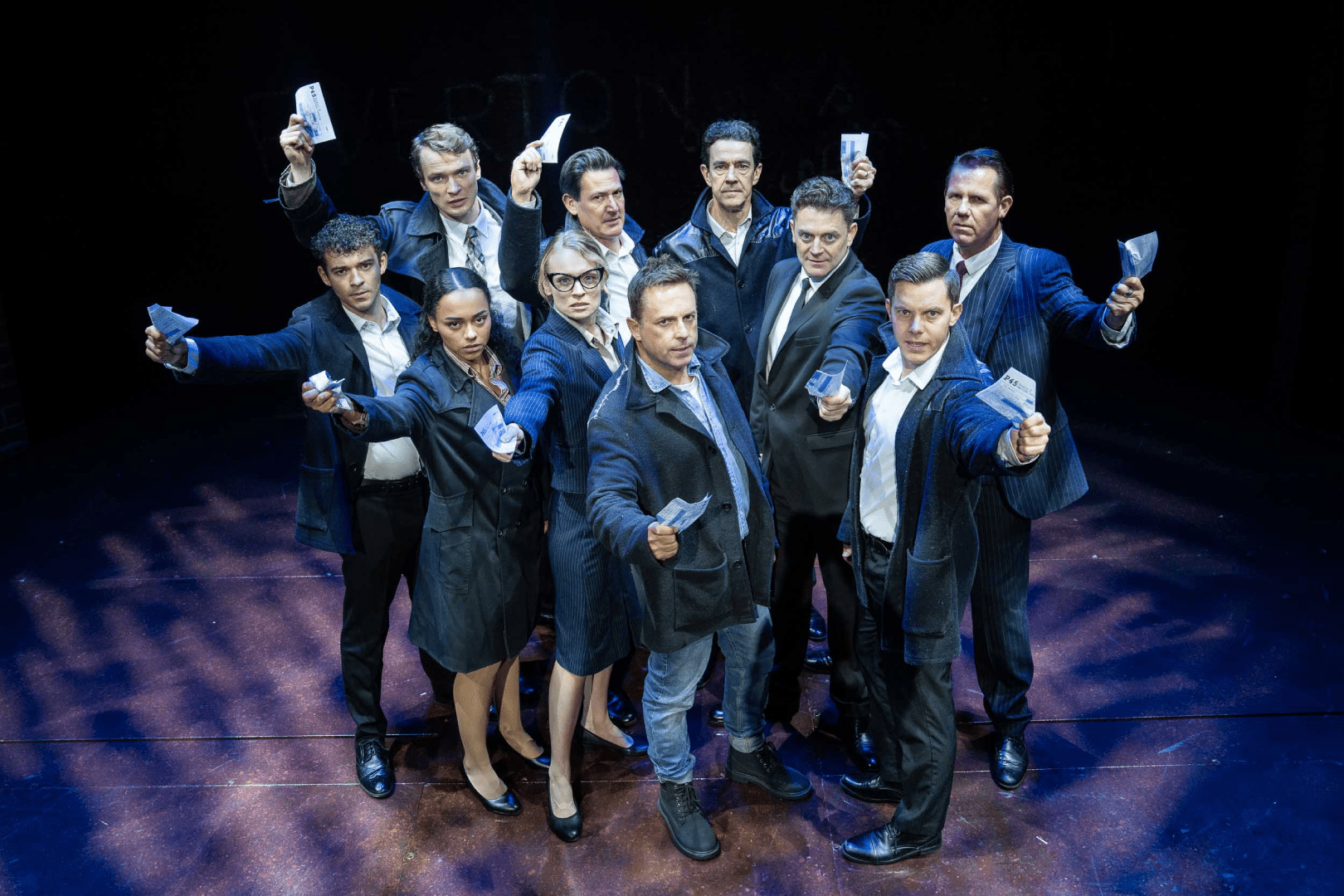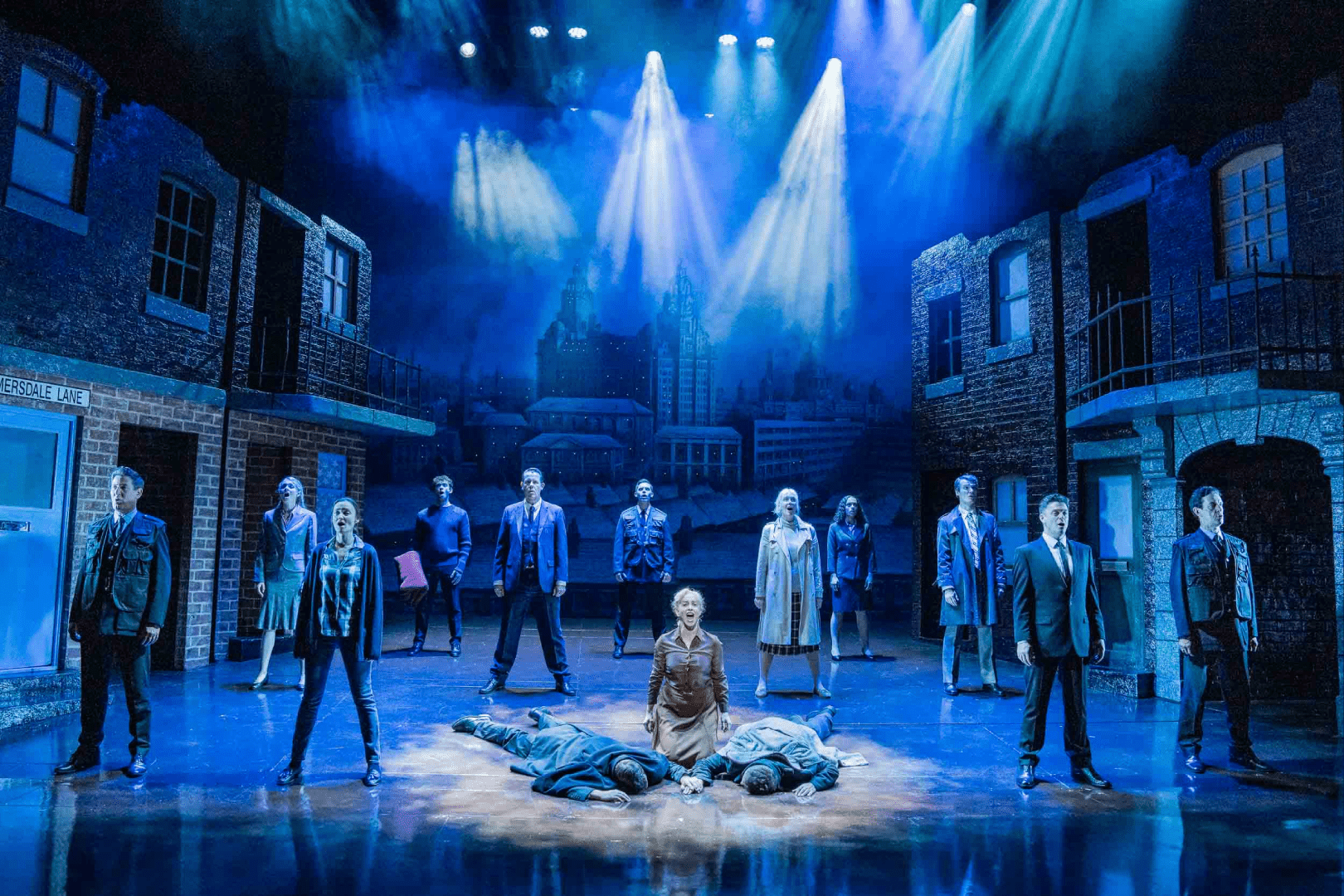Few musicals have left as deep an impression on British theatre as Willy Russell’s Blood Brothers. First performed in 1983, it tells the tragic story of twins separated at birth: Mickey, raised in hardship in a working-class Liverpool household, and Edward, raised in comfort and wealth by a childless upper-middle-class couple. Fate draws the two boys together as friends, then tears them apart when the truth of their birth is revealed, leading to one of the most devastating endings in modern musical theatre. Themes of class division, superstition, and destiny run through the piece, and though some of the dialogue now feels dated, its central ideas remain painfully relevant. A staple of the British curriculum, Blood Brothers is taught frequently in GCSE Drama, GCSE English Literature and KS3 English.
The production itself has a history almost as legendary as the story it tells. Bill Kenwright’s staging ran in the West End for over 24 years, chalking up more than 10,000 performances and becoming known as “the standing ovation musical.” Its songs — “Marilyn Monroe,” “Easy Terms,” “Bright New Day” and the heartbreaking “Tell Me It’s Not True” — are now iconic staples of British musical theatre. Blood Brothers has a cult following, and in Stoke this week it was impossible not to wonder how many of the cheering audience were returning for their second, third, or even tenth visit. The familiarity of the show is both its biggest strength and its greatest weakness.
For while the material itself still resonates, this touring production feels stuck in time. Andy Walmsley’s set has remained essentially unchanged for decades — a painted backdrop of terraced houses that has long since lost its freshness. Lighting and sound design still serve the story, but do little to reimagine it. This in itself would not be a problem if the performances and direction felt newly minted, but the sense of repetition is hard to ignore. Most of the principal cast are long-time associates of the show, and the overall direction by Bob Tomson and Bill Kenwright feels more preserved than alive.
That said, there are still moments of brilliance. Sean Jones, who has played Mickey on and off for 25 years, once again proves why he is so closely associated with the role. His performance is extraordinary in its detail: the cheeky, playful Mickey of the first act is so distinct from the broken, fragile man of the second that it feels like two different actors. He captures every flicker of humour, frustration and despair in Russell’s writing, and his presence alone is enough to justify another visit for devoted fans. Jones is the definitive Mickey Johnstone and nobody will convince me otherwise.
Joe Sleight gives a clear and sympathetic portrayal of Edward, his characterisation consistent and finely judged throughout. The contrast between Eddie’s posh gentility and Mickey’s rough energy is well drawn, and their friendship — and eventual rupture — feels both believable and heartbreaking. Gemma Brodrick, reprising her role as Linda, deserves credit for charting her character’s development with nuance. She brings a bright spark to the childhood scenes, but also finds the pain and weariness in Linda’s later years, making her more than just the pivot of the brothers’ rivalry.

The supporting cast also provide some unexpected highlights. Michael Gillett’s Sammy is a revelation — full of swagger and menace, but also layered with cheeky ad libs and flashes of personality that give the role greater depth than the writing usually affords. Kristofer Harding, returning as the Narrator, is commanding with his dark, velvety voice that threads through the story like a curse. The ensemble — Francesca Benton-Stace, Latesha Karisa, Tim Maxwell-Clarke, Dominic Gore, Alex Harland and Graeme Kinniburgh — bring colour to the margins of the story. Their delivery of throwaway lines and background interactions adds texture and humour, helping the show feel alive even in its more familiar beats.
However, the direction of the two central mothers is more uneven. Vivienne Carlyle, a strong singer who earned nightly standing ovations during her West End tenure, is directed here to lean heavily into melodrama. Her Mrs Johnstone is all big hand gestures and belted notes — technically impressive, but at times emotionally distancing. The park-and-bark staging of her numbers makes it harder to believe in her as a struggling Liverpudlian mother, though she recovers some authenticity in the second act where her appearances are less frequent but more emotionally direct. Paula Tappenden’s Mrs Lyons, meanwhile, suffers from an overly rushed delivery in the early scenes. The dialogue between Mrs Johnstone and Mrs Lyons, particularly in the moment when the pact is sealed, is played at such speed that it loses much of its tension and weight.
One positive change in this tour is the clearer foreshadowing of the bond between Edward and Linda. Their relationship is given more space, making the love triangle with Mickey more inevitable and, ultimately, more devastating. Linda’s pain in the second act is particularly well conveyed, and it strengthens the tragic sweep of the closing scenes.
Musically, the production is as strong as ever. Matt Malone’s supervision keeps the score tight and punchy, and the Narrator’s haunting refrains still cut through the action with chilling power. The songs remain the heartbeat of Blood Brothers and continue to be greeted with audible sighs of recognition and delight from the audience.
On press night in Stoke, the audience responded exactly as they always have: raucous laughter in the first half, a palpable hush during the climax, and an immediate standing ovation at the curtain call. For fans, Blood Brothers delivers what it always has — powerful songs, tragic storytelling, and a night of theatre that feels familiar and cathartic.

But there is no denying that the show is ready for reappraisal. Kenwright’s production, for all its endurance, is showing its age. The material is strong enough to merit a full-scale revival — one with fresh design, sharper direction, and a renewed focus on the play’s gritty roots. Until that happens, this tour will continue to delight its loyal fanbase, but risks alienating new audiences who may find it more dated than iconic.
Blood Brothers remains a vital piece of British musical theatre, anchored by Sean Jones’s definitive Mickey and supported by a strong cast. Yet the production itself is beginning to creak under the weight of its history. A new generation deserves to see Russell’s masterpiece reborn, not just preserved.
Blood Brothers plays at the Regent Theatre until Saturday 27th September 2025 and will then continue its UK tour. Tickets available here.

Photography throughout from Jack Merriman.


Leave a Reply